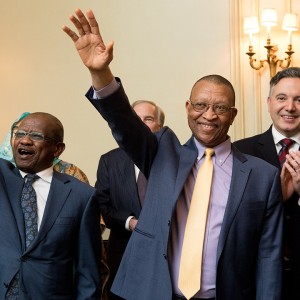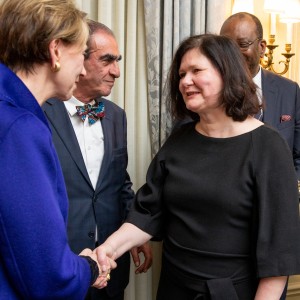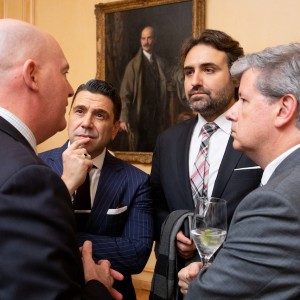Redefining Diplomacy
Report: Redefining Diplomacy in the Wake of the COVID-19 Pandemic
The COVID-19 pandemic has upended every aspect of life. Industries have been disrupted. Businesses, schools, and governments implemented radical new policies in order to resume operations and adapt for the future in a “new normal.”
Diplomats joined the front lines of the crisis, with embassies struggling to maintain their diplomatic footprint, strengthen important bilateral cooperation, and provide consular services in a complex environment to stranded nationals.
The virus has fundamentally changed diplomacy in Washington. Our nation’s capital, until recently the diplomatic crossroads of the world, has now gone into “hibernation.” Instead of flocking to Washington for meetings at the White House, State Department, or World Bank, world leaders and ministers are forced to conduct diplomacy over video conferences and phone calls, while ambassadors carry the load of representation and advocacy. Embassies and diplomatic residences, once the hubs of envoys from the U.S. and around the world gathering for cultural events and receptions, are now eerily quiet.
This inaugural report examines how diplomatic norms, embassy operations, and the role of diplomats themselves have changed and will continue to evolve in the wake of the crisis. It synthesizes insights shared by a range of current and former diplomats from across the globe, about trends in the evolution of diplomacy in a post-COVID world where alliances are shifting, polarization is deepening, and skepticism of global engagement had already been growing, particularly here in the United States.
Authored by Elise Labott | Produced and Edited by The Meridian Center for Diplomatic Engagement
Contributor Excerpts
Click the contributor name to read the excerpt.
| Name | Title |
|---|---|
| His Excellency Jorge Argüello | Ambassador of Argentina to the U.S. |
| H.R.H Princess Reema bindt Bandar Al-Saud | Ambassador of the Kingdom of Saudi Arabia to the U.S. |
| The Honorable Paula J. Dobriansky | Senior Fellow, Harvard University Belfer Center for Science and International Affairs; Under Secretary of State for Global Affairs (2001-2009) |
| Her Excellency Bergdís Ellertsdóttir | Ambassador of Iceland to the U.S. |
| The Honorable Kay Bailey Hutchison | Permanent Representative of the U.S. to NATO |
| Her Excellency Dina Kawar | Ambassador of the Hashemite Kingdom of Jordan to the U.S. |
| His Excellency Stavros Lambrinidis | Delegation of the European Union to the U.S. |
| The Honorable Christopher Landau | U.S. Ambassador to Mexico |
| Lawrence Manzi | Deputy Chief of Mission, Embassy of the Republic of Rwanda |
| Lieutenant General H.R. McMaster | U.S. National Security Advisor (2017-2018); Senior Fellow, Hoover Institution |
| Her Excellency Nomaindia Mfeketo | Ambassador of the Republic of South Africa to the U.S. |
| Sirpa Nyberg | Minister Counsellor, Head of Political Section, Embassy of Finland |
| The Honorable Thomas R. Pickering | Under Secretary of State for Political Affairs (1997-2000); U.S. Ambassador to the UN in New York (1989-1992) |
| Her Excellency Roya Rahmani | Ambassador of the Islamic Republic of Afghanistan to the U.S. |
| His Excellency Arturo Sarukhan | Senior Fellow, Brookings Institution; Ambassador of Mexico to the U.S. (2007-2013) |
| The Honorable Thomas Shannon | Under Secretary of State for Political Affairs (2016-2018) |
| His Excellency Shinsuke Sugiyama | Ambassador of Japan to the U.S. |
| His Excellency Elin Suleymanov | Ambassador of the Republic of Azerbaijan to the U.S. |
| The Honorable Kurt Volker | U.S. Special Representative for Ukraine Negotiations (2017-2019); U.S. Ambassador to NATO (2008-2009) |
About the Redefining Diplomacy Initiative
As the world becomes more divided and isolated, the importance of diplomacy is augmenting. At the same time, technological advancements and new global paradigms are changing the landscape for diplomats. The COVID-19 pandemic has brought a new set of complications, upending traditional diplomatic norms and forms of communication.
The Meridian Center for Diplomatic Engagement is seeking to explore how diplomacy has and might change in the short- and long-term, and the ways that governments, NGOs and the private sector can support diplomacy’s necessary evolution and continued global engagement. The Redefining Diplomacy Initiative will examine how diplomatic practices, embassy operations and the role of diplomats themselves have changed and will continue to evolve. Through projects focused on how to build the necessary skills and capabilities for the next generation of diplomatic leaders, the ways that public and cultural diplomacy are changing to reach larger swathes of the population via the digital sphere, and many more initiatives, Meridian seeks to help our community redefine diplomacy to cope with our transforming world.
read more on the evolution of diplomacy


